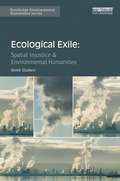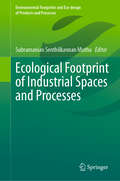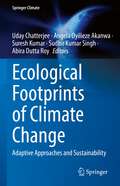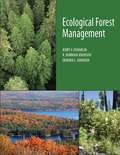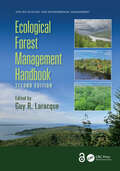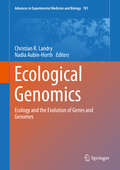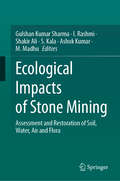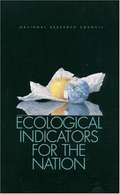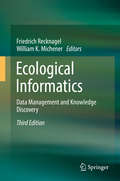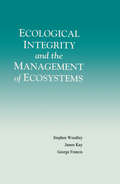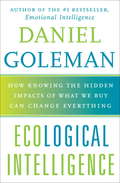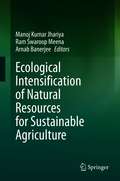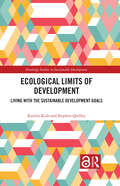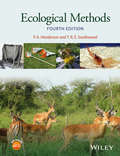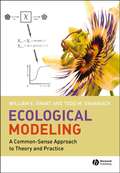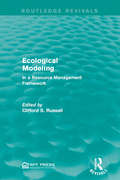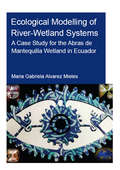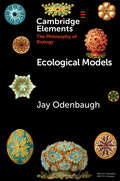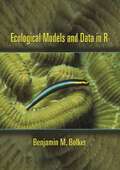- Table View
- List View
Ecological Ethics and the Philosophy of Simone Weil: Decreation for the Anthropocene (Routledge Environmental Ethics)
by Kathryn LawsonThis book places the philosophy of Simone Weil into conversation with contemporary environmental concerns in the Anthropocene.The book offers a systematic interpretation of Simone Weil, making her ethical philosophy more accessible to non-Weil scholars. Weil’s work has been influential in many fields, including politically and theologically-based critiques of social inequalities and suffering, but rarely linked to ecology. Kathryn Lawson argues that Weil’s work can be understood as offering a coherent approach with potentially widespread appeal applicable to our ethical relations to much more than just other human beings. She suggests that the process of "decreation" in Weil is an expansion of the self which might also come to include the surrounding earth and a vast assemblage of others. This allows readers to consider what it means to be human in this time and place, and to contemplate our ethical responsibilities both to other humans and also to the more-than-human world. Ultimately, the book uses Weil’s thought to decanter the human being by cultivating human actions towards an ecological ethics.This book will be useful for Simone Weil scholars and academics, as well as students and researchers interested in environmental ethics in departments of comparative literature, theory and criticism, philosophy, and environmental studies.
Ecological Exile: Spatial Injustice and Environmental Humanities (Routledge Environmental Humanities)
by Derek GladwinEcological Exile explores how contemporary literature, film, and media culture confront ecological crises through perspectives of spatial justice – a facet of social justice that looks at unjust circumstances as a phenomenon of space. Growing instances of flooding, population displacement, and pollution suggest an urgent need to re-examine the ways social and geographical spaces are perceived and valued in the twentieth and twenty-first centuries. Maintaining that ecological crises are largely socially produced, Derek Gladwin considers how British and Irish literary and visual texts by Ian McEwan, Sarah Gavron, Eavan Boland, John McGrath, and China Miéville, among others, respond to and confront various spatial injustices resulting from fossil fuel production and the effects of climate change. This ambitious book offers a new spatial perspective in the environmental humanities by focusing on what the philosopher Glenn Albrecht has termed 'solastalgia' – a feeling of homesickness caused by environmental damage. The result of solastalgia is that people feel paradoxically ecologically exiled in the places they continue to live because of destructive environmental changes. Gladwin skilfully traces spatially produced instances of ecological injustice that literally and imaginatively abolish people’s sense of place (or place-home). By looking at two of the most pressing social and environmental concerns – oil and climate – Ecological Exile shows how literary and visual texts have documented spatially unjust effects of solastalgia. This interdisciplinary book will appeal to students, scholars, and professionals studying literary, film, and media texts that draw on environment and sustainability, cultural geography, energy cultures, climate change, and social justice.
Ecological Footprint of Industrial Spaces and Processes (Environmental Footprints and Eco-design of Products and Processes)
by Subramanian Senthilkannan MuthuThis book describes and offers cases in the assessment of Ecological Footprint (EF) in different industrial spaces and processes. Ecological Footprint is a useful metric that measures the level of resources from the environment that are required to support a specific way of life or business. This book enumerates the concept of EF and how this concept can be applied to a variety of industrial spaces and processes including textile manufacture, electric vehicle charging, construction materials, and agriculture.
Ecological Footprints of Climate Change: Adaptive Approaches and Sustainability (Springer Climate)
by Suresh Kumar Sudhir Kumar Singh Uday Chatterjee Angela Oyilieze Akanwa Abira Dutta RoyThis book explores global implications of human activities that trigger changes in climate and the appropriate scientific, adaptive, and sustainable approaches as a proven information tool. It reveals that the ecological, social, and economic dynamics of the changing earth encompasses huge uncertainties coupled with its ability to be linked to other forms of global change. From a scientific perspective, multiple efforts are expedient to integrate the many aspects of global changes. Increases in science and technology have afforded nations the ability to plan for the future by investing in adaptive and mitigative measures to monitor present and future changes. Just as the climatic and ecological impacts of climate change are unequally distributed, so is the adaptive capacity to cope with these impacts in different nations. Considering that wealth, infrastructure, and political stability all contribute to a nation's capacity to anticipate and respond to change. So, global South nations who are disadvantaged in these areas are faced with more inequalities and more unique adaptive strategies. There is need for increased aggregate efforts and interaction between scientists, stakeholders, and policy makers to improve both decision-making and global change in science. Scientists and researchers need to work on expanding the range of polices that are proposed, debated, and implemented. This way, novelty, new ideas and methodologies are infused into the society. At this point of multiple climate footprints, there is an immense need to explore all ideas evaluating their possibilities in presenting alternative futures, developing alternative policies, and adaptive options to solve the intractable ecological footprints of climate change.
Ecological Forest Management
by Jerry F. Franklin K. Norman Johnson Debora L. JohnsonFundamental changes have occurred in all aspects of forestry over the last 50 years, including the underlying science, societal expectations of forests and their management, and the evolution of a globalized economy. This textbook is an effort to comprehensively integrate this new knowledge of forest ecosystems and human concerns and needs into a management philosophy that is applicable to the vast majority of global forest lands. Ecological forest management (EFM) is focused on policies and practices that maintain the integrity of forest ecosystems while achieving environmental, economic, and cultural goals of human societies. EFM uses natural ecological models as its basis contrasting it with modern production forestry, which is based on agronomic models and constrained by required return-on-investment. The book concludes with an overview of how EFM can contribute to resolving major 21st century issues in forestry, including sustaining forest dependent societies.
Ecological Forest Management Handbook (Applied Ecology and Environmental Management)
by Guy R. LarocqueThe second edition of Ecological Forest Management Handbook continues to provide forestry professionals and students with basic principles of ecological forest management and their applications at regional and site-specific levels. Thoroughly updated and revised, the handbook addresses numerous topics and explains that ecological forest management is a complex process that requires broad ecological knowledge. It discusses how to develop adaptive management scenarios to harvest resources in a sustainable way and provide ecosystem services and social functions. It includes new studies on ecological indicators, the carbon cycle, and ecosystem simulation models for various forest types: boreal, temperate, and tropical forests.NEW IN THE SECOND EDITION Provides a comprehensive collection of sustainable forest management principles and their applications Covers new ecological indicators that can be applied to address forest environmental issues Includes all types of models: empirical, gap, and process-based models Explains several basic ecological and management concepts in a clear, easy-to- understand manner This handbook is intended for researchers, academics, professionals, and undergraduate and graduate students studying and/or involved in the management of forest ecosystems.Chapters 16 and 18 of this book are available for free in PDF format as Open Access from the individual product page at www.taylorfrancis.com. They have been made available under a Creative Commons Attribution-Non Commercial-No Derivatives 4.0 license.
Ecological Genomics
by Christian R. Landry Nadia Aubin-HorthResearchers in the field of ecological genomics aim to determine how a genome or a population of genomes interacts with its environment across ecological and evolutionary timescales. Ecological genomics is trans-disciplinary by nature. Ecologists have turned to genomics to be able to elucidate the mechanistic bases of the biodiversity their research tries to understand. Genomicists have turned to ecology in order to better explain the functional cellular and molecular variation they observed in their model organisms. We provide an advanced-level book that covers this recent research and proposes future development for this field. A synthesis of the field of ecological genomics emerges from this volume. Ecological Genomics covers a wide array of organisms (microbes, plants and animals) in order to be able to identify central concepts that motivate and derive from recent investigations in different branches of the tree of life. Ecological Genomics covers 3 fields of research that have most benefited from the recent technological and conceptual developments in the field of ecological genomics: the study of life-history evolution and its impact of genome architectures; the study of the genomic bases of phenotypic plasticity and the study of the genomic bases of adaptation and speciation.
Ecological Impacts of Stone Mining: Assessment and Restoration of Soil, Water, Air and Flora
by Ashok Kumar Shakir Ali Gulshan Kumar Sharma I. Rashmi S. Kala M. MadhuThis edited book covers the impact of stone mining activities on soil, water, air, agriculture, vegetation, and policy aspects. It provides information on rehabilitation and restoration measures for stone mine spoil areas and other associated adverse impacts on human health caused by mining activities. Additionally, the book covers information related to the impact of stone mining on the socio-economic conditions of mining area inhabitants and appropriate government policies and support to meet the United Nations Sustainable Development Goals-15.3 (SDG-15.3) for degraded stone mine spoil sites toward Land Degradation Neutrality (LDN). The dumping of stone mine waste has many negative implications for the environment, soil, and natural resources. Although stone mining is the main source of livelihood for millions of people around the world and plays a crucial role in the economic development of many countries, it was estimated that nearly 4 million people die every year, especially in developing countries, due to environmental pollution from quarrying, sandblasting, and the emission of toxic gases. Mining leads to land degradation by the stacking of mine waste, loss of fertile topsoil and vegetation covers, abstraction and deterioration of the natural drainage system, deforestation, groundwater depletion, loss of plant and aquatic biodiversity, and public health issues. The book covers information about all aspects of dimensional stone mining activity and is a useful read for researchers, planners, capacity builders, scientists, and policymakers for achieving SDG 15.3. It would also be helpful for undergraduate and graduate students of agriculture, forestry, ecology, soil science, and environmental science disciplines.
Ecological Indicators for the Nation
by National Research CouncilEnvironmental indicators, such as global temperatures and pollutant concentrations, attract scientists' attention and often make the headlines. Equally important to policymaking are indicators of the ecological processes and conditions that yield food, fiber, building materials and ecological "services" such as water purification and recreation.This book identifies ecological indicators that can support U.S. policymaking and also be adapted to decisions at the regional and local levels. The committee describes indicators of land cover and productivity, species diversity, and other key ecological processes--explaining why each indicator is useful, what models support the indicator, what the measured values will mean, how the relevant data are gathered, how data collection might be improved, and what effects emerging technologies are likely to have on the measurements.The committee reviews how it arrived at its recommendations and explores how the indicators can contribute to policymaking. Also included are interesting details on paleoecology, satellite imagery, species diversity, and other aspects of ecological assessment.Federal, state, and local decisionmakers, as well as environmental scientists and practitioners, will be especially interested in this new book.
Ecological Informatics
by Friedrich Recknagel William K. MichenerEcological Informatics is defined as the design and application of computational techniques for ecological analysis, synthesis, forecasting and management. The book provides an introduction to the scope, concepts and techniques of this newly emerging discipline. It illustrates numerous applications of Ecological Informatics for stream systems, river systems, freshwater lakes and marine systems as well as image recognition at micro and macro scale. Case studies focus on applications of artificial neural networks, genetic algorithms, fuzzy logic and adaptive agents to current ecological management issues such as toxic algal blooms, eutrophication, habitat degradation, conservation of biodiversity and sustainable fishery
Ecological Integrity and the Management of Ecosystems
by James Kay Steven WoodleyToday, efforts are being made to rehabilitate badly degraded ecosystems and protect areas which have important ecological value, such as national parks, critical fish and wildlife habitats, natural communities and endangered species.Since human values are an integral part of the decisions to protect or rehabilitate-the goals and objectives for such actions are often unclear. Concepts of "health," "integrity" and "diversity" express important values associated with management actions but they do not provide clear guidelines for these actions.The criteria developed and applied in this book provide guidelines and serve as a road map to anyone involved in ecosystem management-scientists, land managers and policy makers.
Ecological Integrity in Science and Law: Science, Ethics And The Law (Routledge Research In International Environmental Law Ser.)
by Laura Westra Klaus Bosselmann Matteo FermegliaThis book offers recent insights into some of the burning issues of our times: climate change, exposure to chemicals, refugee issues and the ecological harm that accompanies conflict situations. It brings together a group of pioneering scholars, mostly legal experts but also thinkers from various scientific disciplines, to discuss concerns from around the globe – from Australia and New Zealand, to Canada and the United States, European countries including Germany, Italy, Britain and the Czech Republic, as well as the African continent. Presenting the latest climate and ecology-related case law, as well as analyses of the conceptual issues that underlie international problems, it covers the extinction of species, the basic role of women and Indigenous peoples in protecting the environment, the failure of today’s states to protect the human right to a safe environment and public health, the harm arising from industrial food production, and the problems resulting from a growth-oriented economy. Lastly, the book examines various international legal principles and regulations that have been proposed to defend global ecological rights.
Ecological Intelligence: How Knowing the Hidden Impacts of What We Buy Can Change Everything
by Daniel GolemanThe bestselling author of Emotional Intelligence and Primal Leadership now brings us Ecological Intelligence—revealing the hidden environmental consequences of what we make and buy, and how with that knowledge we can drive the essential changes we all must make to save our planet and ourselves.We buy “herbal” shampoos that contain industrial chemicals that can threaten our health or contaminate the environment. We dive down to see coral reefs, not realizing that an ingredient in our sunscreen feeds a virus that kills the reef. We wear organic cotton t-shirts, but don’t know that its dyes may put factory workers at risk for leukemia. In Ecological Intelligence, Daniel Goleman reveals why so many of the products that are labeled green are a “mirage,” and illuminates our wild inconsistencies in response to the ecological crisis.Drawing on cutting-edge research, Goleman explains why we as shoppers are in the dark over the hidden impacts of the goods and services we make and consume, victims of a blackout of information about the detrimental effects of producing, shipping, packaging, distributing, and discarding the goods we buy.But the balance of power is about to shift from seller to buyer, as a new generation of technologies informs us of the ecological facts about products at the point of purchase. This “radical transparency” will enable consumers to make smarter purchasing decisions, and will drive companies to rethink and reform their businesses, ushering in, Goleman claims, a new age of competitive advantage.
Ecological Intensification of Natural Resources for Sustainable Agriculture
by Ram Swaroop Meena Manoj Kumar Jhariya Arnab BanerjeeEcological intensification involves using natural resources such as land, water, soil nutrients, and other biotic and abiotic variables in a sustainable way to achieve high performance and efficiency in agricultural yield with minimal damage to the agroecosystems. With increasing food demand there is high pressure on agricultural systems. The concept of ecological intensification presents the mechanisms of ensuring high agricultural productivity by restoration the soil health and landscape ecosystem services. The approach involves the replacement of anthropogenic inputs with eco-friendly and sustainable alternates. Effective ecological intensification requires an understanding of ecosystems services, ecosystem's components, and flow of resources in the agroecosystems. Also, awareness of land use patterns, socio-economic factors, and needs of the farmer community plays a crucial role. It is therefore essential to understand the interaction of ecosystem constituents within the extensive agricultural landscape. The editors critically examined the status of ecological stress in agroecosystems and address the issue of ecological intensification for natural resources management. Drawing upon research and examples from around the world, the book is offering an up-to-date account, and insight into the approaches that can be put in practice for poly-cropping systems and landscape-scale management to increase the stability of agricultural production systems to achieve ‘Ecological resilience’. It further discusses the role of farmer communities and the importance of their awareness about the issues. This book will be of interest to teachers, researchers, climate change scientists, capacity builders, and policymakers. Also, the book serves as additional reading material for undergraduate and graduate students of agriculture, forestry, ecology, agronomy, soil science, and environmental sciences. National and international agricultural scientists, policymakers will also find this to be a useful read for green future.
Ecological Interactions And Biological Control
by David A. Andow David W. Ragsdale Robert F. NyvallRecent interest in nonchemical methods of pest control has brought renewed attention to the biological control of plant pests in the fields of entomology, plant pathology, and weed science. Ecological Interactions and Biological Control addresses issues of theory and practice common to all three fields. Focusing on systems rather than on individual
Ecological Interplays in Microbial Enzymology (Environmental and Microbial Biotechnology)
by Naga Raju Maddela Ram Prasad Aransiola Sesan AbiodunThis contributed volume compiles the latest developments in the field of microbial enzymology. It focuses on topics such as distribution of microbial enzymes in natural habitats, microbial enzymes in environmental sustainability, and environmental disturbances on microbial enzymes, which are organized into three parts, respectively. Ranging from micro-scale studies to macro, it covers a huge domain of microbial enzymes and their interplay between the components of the environment. Overall, the book portrays the importance of microbial enzyme technology and its role in solving the problems in modern-day life. The book is a ready reference for practicing students and researchers in environmental engineering, chemical engineering, agricultural engineering, and other allied fields.
Ecological Liberation Theology
by Kathleen Nadeau William Holden Emma PorioClimate change-related effects and aftermaths of natural disasters, such as Typhoon Haiyan in the Philippines, have wreaked havoc on local peoples' lives and livelihoods, especially in impoverished coastal communities. This book looks at local-level responses to the effects of climate change from the perspective of ecological theology and feminism, which provides a solution-based and gender-equitable approach to some of the problems of climate change. It examines how local social and religious action workers are partnering with local communities to transform and reconstruct their lives and livelihoods in the 21st century.
Ecological Limits of Development: Living with the Sustainable Development Goals (Routledge Studies in Sustainable Development)
by Stephen Quilley Kaitlin KishEmbracing the reality of biophysical limits to growth, this volume uses the technical tools from ecological economics to recast the Sustainable Development Goals (SDGs) as Ecological Livelihood Goals – policy agendas and trajectories that seek to reconcile the social and spatial mobility and liberty of individuals, with both material security and ecological integrity. Since the 1970s, mainstream approaches to sustainable development have sought to reconcile ecological constraints with modernization through much vaunted and seldom demonstrated strategies of ‘decoupling’ and ‘dematerialization’. In this context, the UN SDGs have become the orchestrating drivers of sustainability governance. However, biophysical limits are not so easily sidestepped. Building on an ecological- economic critique of mainstream economics and a historical- sociological understanding of state formation, this book explores the implications of ecological limits for modern progressive politics. Each chapter outlines leverage points for municipal engagement in local and regional contexts. Systems theory and community development perspectives are used to explore under- appreciated avenues for the kind of social and cultural change that would be necessary for any accommodation between modernity and ecological limits. Drawing on ideas from H.T. Odum, Herman Daly, Zigmunt Bauman, and many others, this book provides guiding research for a convergence between North and South that is bottom-up, household-centred, and predicated on a re- emerging domain of Livelihood. In each chapter, the authors provide recommendations for reconfiguring the UN’s SDGs as Ecological Livelihood Goals – a framework for sustainable development in an era of limits. This book will be of great interest to students and scholars of ecological economics, socio- ecological systems, political economy, international and community development, global governance, and sustainable development.
Ecological Living
by John GusdorfThis book emphasizes how we already have the technologies available, including renewable energy and the ability to recycle most materials, to make ecological living possible and that perceived barriers to energy transitions can be overcome. Human life relies upon two systems: the biosphere and the system that produces our goods and services. Today, these two systems are in conflict, and we all face the question of whether we can stop damaging our environment while still supplying the essential goods and services we have come to depend on. Ecological Living presents an optimistic vision of our future by showing how decoupling the productive system from resource extraction is possible, and how this is a key means of achieving an equitable world within environmental limits. For long-term sustainability, the book argues that we must become more efficient in the use of our resources so that resource extraction, and the accompanying environmental costs, can be reduced. Demonstrating the essential steps towards a just and sustainable world, Ecological Living will be of great interest to all students, academics, and policymakers working in the field of environment and sustainability.
Ecological Methods
by Peter A. Henderson T. R. Southwood4th edition of this classic Ecology text Computational methods have largely been replaced by descriptions of the available software Includes procedure information for R software and other freely available software systems Now includes web references for equipment, software and detailed methodologies
Ecological Modeling: A Common-Sense Approach to Theory and Practice
by William E. Grant Todd M. SwannackEcological Modeling:A Commonsense Approach to Theory and Practice explores how simulation modeling and its new ecological applications can offer solutions to complex natural resource management problems. This is a practical guide for students, teachers, and professional ecologists. Examines four phases of the modeling process: conceptual model formulation, quantitative model specification, model evaluation, and model use Provides useful building blocks for constructing systems simulation models Includes a format for reporting the development and use of simulation models Offers an integrated systems perspective for students, faculty, and professionals Features helpful insights from the author, gained over 30 years of university teaching "I can strongly recommend the book as textbook for all courses in population dynamic modeling particularly when the course is planned for the second or third year of a bachelor study in ecology, environmental science or ecological engineering. It uncovers very clearly for the readers the scientific idea and thinking behind modeling and all the necessary steps in the development of models." Ecological Modeling Journal, 2009
Ecological Modeling: In a Resource Management Framework (Routledge Revivals)
by Clifford S. RussellThis volume, originally published in 1975, grew out of Resources for the Future’s involvement as a consultant to the Marine Ecosystem Analysis programme management within the National Oceanic and Atmospheric Agency. Here, researchers look at the state of the art in aquatic ecological modelling in a resource management context. Although the aim of the research in this volume is specific, the models used can be applied in broader contexts and provide conceptual frameworks for regional residuals-environmental quality management and other ecological modelling. This title is suitable for students interested in Environmental Studies.
Ecological Modelling of River-Wetland Systems: A Case Study for the Abras de Mantequilla Wetland in Ecuador (IHE Delft PhD Thesis Series)
by Maria Gabriela Alvarez MielesAround 6% of the Earth's land surface is covered by wetlands. Wetlands play a key role in hydrological and biogeochemical cycles, delivering multiple benefits to society: sources of water supply, flood regulation, water purification, agriculture, fisheries, and biodiversity. Hence, wetland systems are of immense socio-economic as well as ecological importance. In this research, the focus was on the Abras de Mantequilla (AdM) wetland in the tropical coastal region of Ecuador, a RAMSAR site and case study area for the EU-FP7 WETwin project. The research in this thesis involves a combination of field data collection, multivariate analysis techniques, as well as numerical modelling studies. The goal was to explore the effects of changes in hydrological forcing on the hydrodynamic and ecohydraulic responses of the wetland. The study aims to contribute to the understanding of how a tropical river-wetland system functions in terms of hydrodynamics, water quality, primary production, and biotic communities. Spatial patterns of biotic communities and environmental variables are obtained as well as spatio-temporal variability of hydrodynamics, water quality, primary productivity and fish habitat-suitability conditions. In data scarce areas and countries with financial constraints, the combination of field measurements with numerical models was extremely useful and relevant, confirming that these techniques complement each other in obtaining a better understanding of the dynamics of freshwater river–wetland systems. Studies like the present research can be used to enhance awareness about the environmental services of wetlands and stimulate cooperation between all stakeholders in order to achieve more sustainable wetland management.
Ecological Models (Elements in the Philosophy of Biology)
by Jay OdenbaughIn this book, we consider three questions. What are ecological models? How are they tested? How do ecological models inform environmental policy and politics? Through several case studies, we see how these representations which idealize and abstract can be used to explain and predict complicated ecological systems. Additionally, we see how they bear on environmental policy and politics.
Ecological Models and Data in R
by Benjamin M. BolkerEcological Models and Data in R is the first truly practical introduction to modern statistical methods for ecology. In step-by-step detail, the book teaches ecology graduate students and researchers everything they need to know in order to use maximum likelihood, information-theoretic, and Bayesian techniques to analyze their own data using the programming language R. Drawing on extensive experience teaching these techniques to graduate students in ecology, Benjamin Bolker shows how to choose among and construct statistical models for data, estimate their parameters and confidence limits, and interpret the results. The book also covers statistical frameworks, the philosophy of statistical modeling, and critical mathematical functions and probability distributions. It requires no programming background--only basic calculus and statistics. Practical, beginner-friendly introduction to modern statistical techniques for ecology using the programming language R Step-by-step instructions for fitting models to messy, real-world data Balanced view of different statistical approaches Wide coverage of techniques--from simple (distribution fitting) to complex (state-space modeling) Techniques for data manipulation and graphical display Companion Web site with data and R code for all examples

